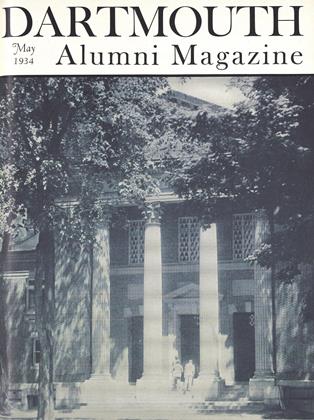Dartmouth Takes To Water A Revival of Crew & Aquatic Sports is Under Way
May 1934 Phil Sherman '28WITH ALL THAT has been written about the Dartmouth crew in the past, and these opera would fill several reams of copy paper, it seems at last that the dream is really walking—or rather rowing.
Since 1877 the idea of a Dartmouth navy has been dormant, and save for a slight resuscitation around 1920, it has remained in a dormant state. The usual arguments have prevailed: the cost of operation, the facilities, the man power, and the site.
Crew being one of the sports where no revenue is attached, it has been felt that Dartmouth could not meet the high expense, which was true. Again, the waters of the Connecticut flow swiftly and treacherously at times, and such waters were not for fragile shells.
But now, after all the talking, it seems that Dartmouth is really going to have a navy, and previous arguments against such a thing melt away before facts.
Some time ago a group of Dartmouth water enthusiasts (and their interest certainly did not center around crew alone) gathered together and laid plans, which were kept carefully under cover until the time was ripe. With little fanfare, they started out to make Dartmouth "marine conscious."
As far back as 1931, perhaps alumni and the sporting public were a bit startled to read that Dartmouth had captured the intercollegiate outboard motor race and championship with a fellow named Theodore M. Thompson of Lake Placid at the controls. As a matter of fact there is considerable interest in this sport, and Thompson, now in his senior year, will again be a contender in the national intercollegiates.
Then came the advent of yachting. Last year the skippers of two boats combined to win the intercollegiate yachting title for Dartmouth, and again sports followers were surprised, for Dartmouth has cer tainly never been known for marine gyrations. But a yacht, flying the colors of the Dartmouth Corinthian Yacht Club, its pennant duly registered, had done the trick, and the commodore was a chap named Jack Odell '35 from Delhi, N. Y. Frank Hekma and Jack Gordon were his shipmates.
Odell's next move was to organize interest in a crew, which was the largest step of all. With William K. Daniells '34, and juniors Philip S. Hemphill of Jamestown, N. Y.; Frank S. Corlett of Minneapolis, Minn.; Victor H. Luneborg of Forest Hills, N. Y.; Richard L. eKnney of West Newton, Mass.; and Alexander Atherton of Honolulu; sophomore Richard D. Taber of New Bedford, Mass., and freshman Oliver Butterworth of West Hartford, Conn., work was started.
THE FRUITS of work of this group are already evident, and in fact developments have come along in quick sequence. First, the arrival of two eight-oared shells, the gift of Phillips Exeter Academy, revived the interest in rowing, and then followed the acquisition of a boathouse on the shores of Lake Mascoma and a landing raft for launching the shells.
If there was any question in anybody's mind that Dartmouth could not find the man power for crew, it was dispelled by the first gathering in Dartmouth Hall which met to hear Coach James Smith of the Union Boat Club of New York. Just 156 students turned out, and instead of being neophytes at the sport of rowing, experienced oarsmen were mixed with the willing to-learn.
In the first place, two of the men who attended had rowed on preparatory school crews which had competed in the Henley Regatta, England's famous interscholastic event. They were Philip S. Hemphill, coxswain of the Tabor crew and Oliver Butterworth, who pulled an oar for Kent School a year ago.
It was a diversified group. Exeter sent W. A. Lee and O. M. Sargent; Culver was represented by F. O. Pansing Jr. and F. C. Babcock: Tabor had Richard H. Taylor, A. S. Atherton and W. C. Embry; even the Yale freshmen were represented in Jack Knode, a transfer; Choate's Elliott Palmer and Salisbury's J. L. Umpleby were among those present. In short, the pick of the rowing schools was represented. But the sponsors of the crew, as well as the other sports—yachting, swimming, and outboard motor boating—wish it to be known that the entire project of aquatics at Dartmouth is on an informal basis. There is no pointing in the immediate future for a Dartmouth crew which will compete with established crews of the East; rather the present project calls for intramural work and conditioning for the love of the sport, and that alone.
An old print shows Dartmouth finishing fourth in an intercollegiate crew race. Cornell, Columbia andHarvard are preceding the Green oarsmen across the finish line. Puzzle: Find Princeton.
 View Full Issue
View Full Issue
More From This Issue
-
 Article
ArticleHANOVER BROWSING
May 1934 By Rees H. Bwen -
 Class Notes
Class NotesClass of 1910
May 1934 By Hanrold P. Hinman -
 Class Notes
Class NotesClass of 1918
May 1934 By Allan C. Gottschaldt -
 Class Notes
Class NotesClass of 1905
May 1934 By Arthur E. McClary -
 Class Notes
Class NotesClass of 1933
May 1934 By John S. Monagan -
 Class Notes
Class NotesClass of 1929
May 1934 By F. William Andres










